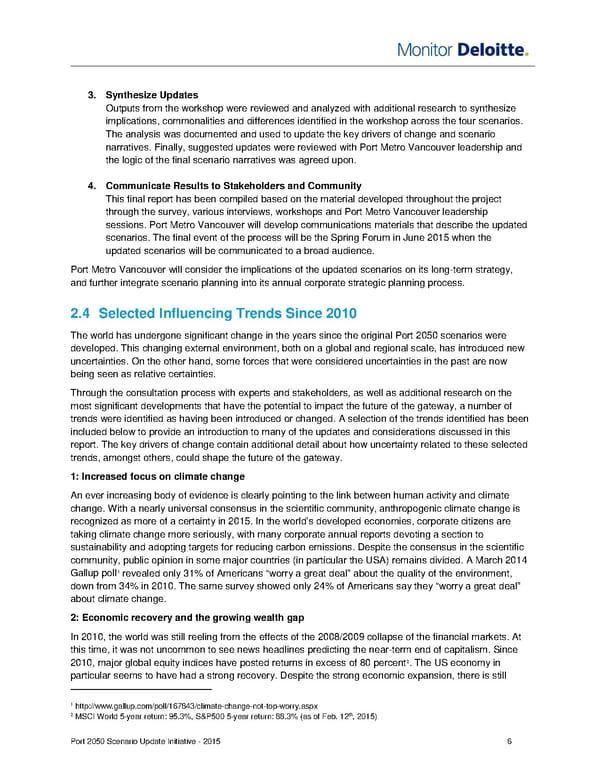3. Synthesize Updates Outputs from the workshop were reviewed and analyzed with additional research to synthesize implications, commonalities and differences identified in the workshop across the four scenarios. The analysis was documented and used to update the key drivers of change and scenario narratives. Finally, suggested updates were reviewed with Port Metro Vancouver leadership and the logic of the final scenario narratives was agreed upon. 4. Communicate Results to Stakeholders and Community This final report has been compiled based on the material developed throughout the project through the survey, various interviews, workshops and Port Metro Vancouver leadership sessions. Port Metro Vancouver will develop communications materials that describe the updated scenarios. The final event of the process will be the Spring Forum in June 2015 when the updated scenarios will be communicated to a broad audience. Port Metro Vancouver will consider the implications of the updated scenarios on its long-term strategy, and further integrate scenario planning into its annual corporate strategic planning process. 2.4 Selected Influencing Trends Since 2010 The world has undergone significant change in the years since the original Port 2050 scenarios were developed. This changing external environment, both on a global and regional scale, has introduced new uncertainties. On the other hand, some forces that were considered uncertainties in the past are now being seen as relative certainties. Through the consultation process with experts and stakeholders, as well as additional research on the most significant developments that have the potential to impact the future of the gateway, a number of trends were identified as having been introduced or changed. A selection of the trends identified has been included below to provide an introduction to many of the updates and considerations discussed in this report. The key drivers of change contain additional detail about how uncertainty related to these selected trends, amongst others, could shape the future of the gateway. 1: Increased focus on climate change An ever increasing body of evidence is clearly pointing to the link between human activity and climate change. With a nearly universal consensus in the scientific community, anthropogenic climate change is recognized as more of a certainty in 2015. In the world’s developed economies, corporate citizens are taking climate change more seriously, with many corporate annual reports devoting a section to sustainability and adopting targets for reducing carbon emissions. Despite the consensus in the scientific community, public opinion in some major countries (in particular the USA) remains divided. A March 2014 Gallup poll1 revealed only 31% of Americans “worry a great deal” about the quality of the environment, down from 34% in 2010. The same survey showed only 24% of Americans say they “worry a great deal” about climate change. 2: Economic recovery and the growing wealth gap In 2010, the world was still reeling from the effects of the 2008/2009 collapse of the financial markets. At this time, it was not uncommon to see news headlines predicting the near-term end of capitalism. Since 2010, major global equity indices have posted returns in excess of 80 percent2 . The US economy in particular seems to have had a strong recovery. Despite the strong economic expansion, there is still 1 http://www.gallup.com/poll/167843/climate-change-not-top-worry.aspx 2 th MSCI World 5-year return: 95.3%, S&P500 5-year return: 88.3% (as of Feb. 12 , 2015) Port 2050 Scenario Update Initiative - 2015 6
 Monitor Deloitte - Final Report Page 7 Page 9
Monitor Deloitte - Final Report Page 7 Page 9